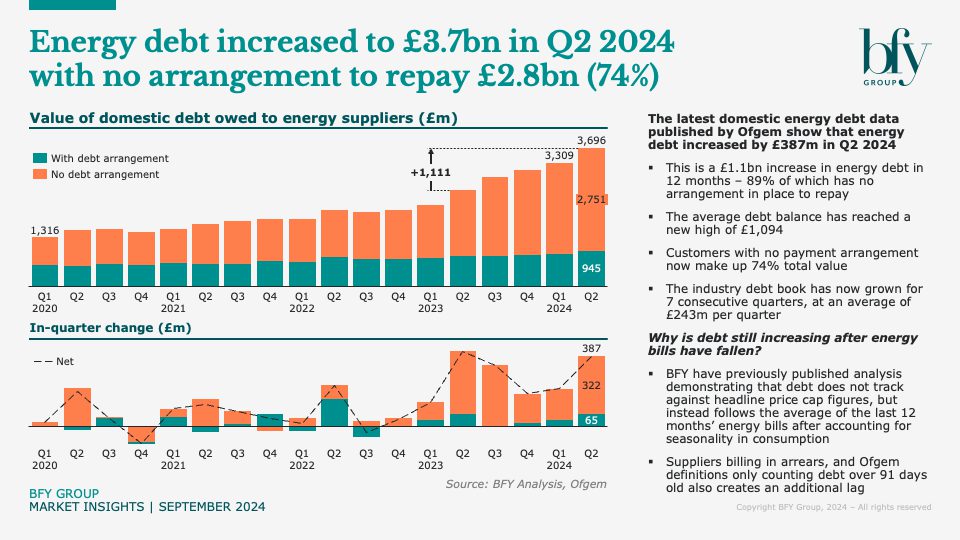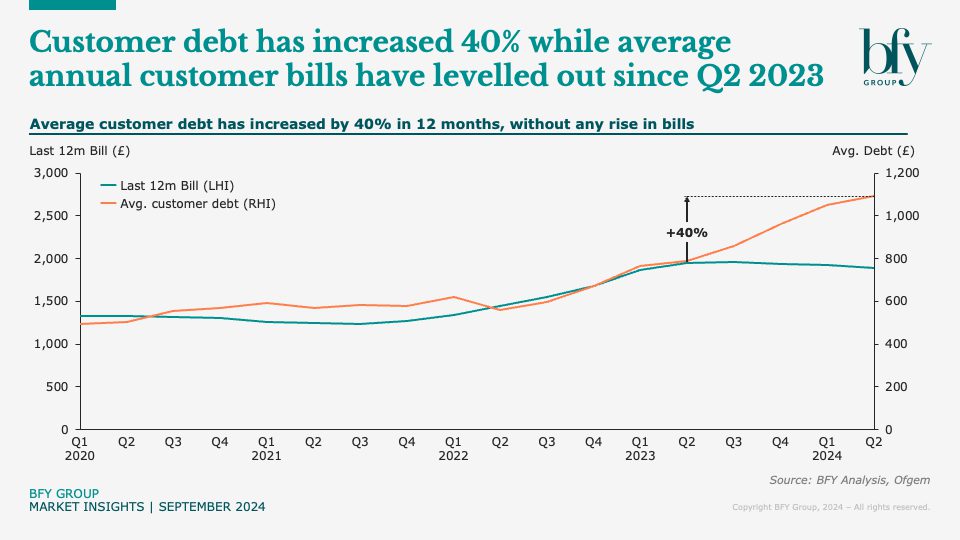Energy debt hits a new peak of £3.7 billion as of Q2 2024 as Average debt per customer rises to a record £1,094
- Energy debt has continued to increase by 40% since Q2 2023 while average annualised customer bills have levelled out
- Official data suggests fewer households are in fuel poverty – but definitions don’t account for repayment of energy debt
Other key findings from the latest data include:
- £2.8 billion of the total debt is owed by customers without repayment arrangements
- A significant increase of £387 million in this quarter alone
- Industry debt has climbed for seven consecutive quarters, averaging £243 million per quarter
- 74% of the total debt is currently without an arrangement for repayment

Energy debt is the worst it’s ever been
Energy debt grew to £3.7 billion as of Q2 2024, a jump of £387 million on the previous quarter. This is the 7th consecutive increase, averaging £243 million per quarter.
The number of customers in debt increased by 230k to 3.4 million, following two consecutive falls. The average debt per customer is now a record £1,094, and more than 56% of these customers have no arrangement in place to repay debt.
In the last 12 months, the total value of debt has grown by £1.1 billion. This is mainly driven by more debts without a payment arrangement, with higher balances:
- The number of debts without a payment arrangement grew by 300k to 1.9 million
- The average balance without an arrangement went up by £350 to £1,450.
- 89% of the £1.1 billion increase in debt in the last 12 months has no arrangement in place to repay.
Long term trends also show a concerning disconnect between bill values and debt. The average debt balance has grown 40% in the last 12 months, while bills have remained flat.
The outlook for debt over the coming winter looks worrying. With the Price Cap going up again, following a mild winter in 23/24, we don’t see annual bills falling any time soon. And with the Winter Fuel Payments being restricted, the coming quarters will be difficult.
"This is an incredibly challenging time for both customers and suppliers. As Ofgem considers potential amendments to the price cap allowances, it is crucial that we focus on the level of support needed for customers continuing to seriously struggle with their energy bills

Matt Turner
Senior Manager

Further support needed for this winter
While there have been some suggestions of new support for customers this winter, concrete plans are needed to give customers, and suppliers, reassurance. However, the current definitions of fuel poverty across England, Wales and Scotland do not factor repayment of debt into any of the definitions – they broadly focus only on the current cost to heat the home.
On this basis, DESNZ recently published that the number of fuel poor households has decreased by 51,000 households and that the fuel poverty gap had decreased to £385. We are increasingly concerned that, without factoring the cost of debt repayment, the wrong policy positions could be taken.
Ian Barker, Managing Partner at BFY Group commented:
We really emphasise the following actions to support customers in this time of crisis:
- Additional support for customers: More comprehensive aid will be necessary to help vulnerable households manage mounting debts. Cross-sector support is needed to ensure customers in need can be identified.
- Continued efforts to improve our homes: The cost of delivering ECO and GBIS are continuing to increase as energy suppliers face higher costs to identify eligible customers and navigate administrative complexity.
- Investment in digital platforms: Self-service platforms will play a vital role in empowering customers to manage their payments and debt arrangements more efficiently.
- Expanded customer service teams: With individual circumstances becoming increasingly complex, more customer service agents will be required to ensure each case is understood and managed effectively.
- Proactive customer engagement: Suppliers will need to lengthen collection cycles and use multiple communication channels to keep customers informed and engaged.
Matt Turner-Tait
Senior Manager
Matt lead clients through key strategic projects exploring growth opportunities, business models, competitive advantage, and mergers & acquisitions.
View Profile

